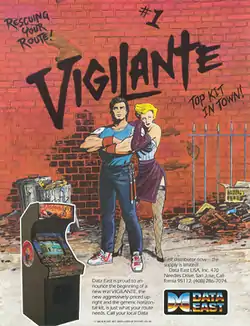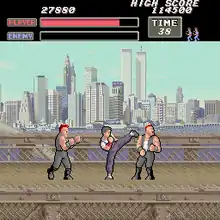Vigilante (video game)
Vigilante (ビジランテ) is a 1988 beat 'em up arcade game developed and published by Irem in Japan and Europe and published in North America by Data East. It is considered as a spiritual sequel to Irem's earlier Kung-Fu Master.
| Vigilante | |
|---|---|
 North American arcade flyer of Vigilante. | |
| Developer(s) | Irem |
| Publisher(s) | |
| Composer(s) | Masato Ishizaki[1] |
| Platform(s) | Arcade, Amiga, Amstrad CPC, Atari ST, Sega Master System, Commodore 64, MSX, TurboGrafx-16, ZX Spectrum, Virtual Console |
| Release | |
| Genre(s) | Beat 'em up |
| Mode(s) | Single-player |
Description
Plot
The game takes place in downtown New York City. The game's plot involves a lone, professional martial artist who became a vigilante to fight an evil gang called the Skinheads ruled by a man known as the Giant Devil, in order to protect his "turf" and save a female hostage named Madonna, who was kidnapped by them.
Gameplay

Players control the titular character using punches and kicks to defeat the Skinheads in a 2D platform manner, while sometimes picking up and using nunchaku against them. If players get hurt while holding nunchuku, they become unarmed. There are five stages in order of appearance: a street, a junkyard, the Brooklyn Bridge, a back street scene and on top of a building that is under construction. Skinheads with Mohawk or spiked hairdo attack the vigilante with knives, chains, motorbikes, rifles and other kinds of weapons. They will also cling to him if he stands too close to them.
Ports and related releases
The arcade game was later ported to several different home computers and consoles. The Sega Master System version was ported by Arc System Works and published exclusively in North America and Europe by Sega, and is one of several games in the console to include an FM sound switch for enhanced music quality. In the Sega Master System version, Madonna was renamed "Maria" and the Skinheads were called the "Rogues".
The ones for Commodore 64, ZX Spectrum, Atari ST, Amiga and the Amstrad CPC were reprogrammed by Emerald Software and published by U.S. Gold mostly in Europe. The MSX version was ported and published by Korean company Clover.[2]
The TurboGrafx-16 version was ported and published in Japan on January 14, 1989 by Irem and published in North America by NEC the same year. This port matches the arcade more than other ports. The TurboGrafx-16 version was later re-released globally for Nintendo's Virtual Console for the Wii in North America on February 5, 2007,[3][4] in Japan on February 6, 2007,[5] in Europe on February 9, 2007,[6] and in Australia on July 6, 2007, but was delisted on March 30, 2012 (on March 31 in Europe) before it returned in September 2013. It was also released for the Wii U Virtual Console in Japan on February 10, 2015, in North America on September 14, 2017 and in Europe on October 5, 2017.[7][8][6]
Reception
| Publication | Score |
|---|---|
| Crash | 8/10 |
| Sinclair User | 6/10 |
| Your Sinclair | 69%[9] |
In Japan, Game Machine listed Vigilante on their April 15, 1988 issue as being the second most-successful table arcade unit of the year.[10]
Your Sinclair summarised the game as "Pretty standard beat 'em up. You've probably seen it all before, so only buy if you're addicted to the genre and you've already got the better ones.".[9]
References
- http://shmuplations.com/rtypesound/
- Clover at Generation MSX - Software Database. Date retrieved October 31, 2009.
- https://web.archive.org/web/20111204214244/http://www.nintendo.com:80/games/gameGuide?download=classic&age=18&page=17&view=grid&sort=&source=
- https://www.nintendo.com/games/detail/v0KnrVb9sI9p1kuJzlCTOd5EnCF3O-7i#game-info
- https://www.nintendo.co.jp/wii/vc/software/02.html
- https://www.nintendo.co.uk/Games/TurboGrafx/Vigilante-280053.html
- https://www.nintendo.co.jp/titles/20010000012907
- https://www.nintendo.com/games/detail/ninja-spirit-wii-u
- https://web.archive.org/web/20160314223748/http://ysrnry.co.uk/articles/vigilante.htm
- "Game Machine's Best Hit Games 25 - テーブル型TVゲーム機 (Table Videos)". Game Machine (in Japanese). No. 330. Amusement Press, Inc. 15 April 1988. p. 21.
External links
- Arcade version
- Vigilante at the Killer List of Videogames
- Vigilante at arcade-history
- Home versions
